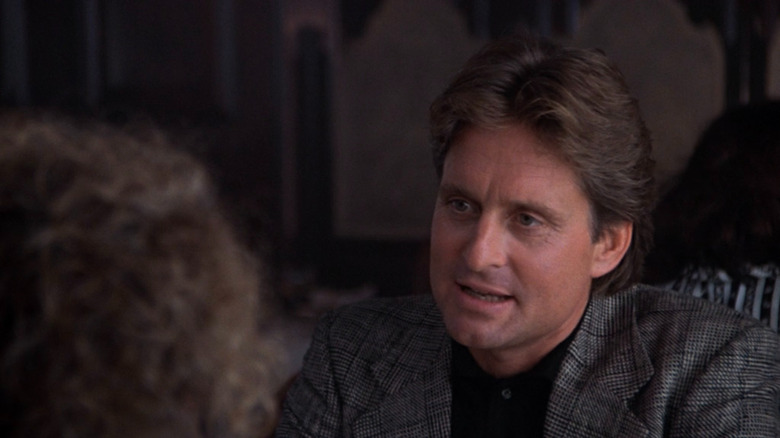Cookies help us deliver our Services. By using our Services, you agree to our use of cookies. Learn More.
Why Michael Douglas Doesn’t Like Intimacy Coordinators In Sex Scenes
The idea of having intimacy coordinators on movie sets is relatively new, but they’re poised to change Hollywood forever. Many film and television productions have sex scenes, so these individuals ensure all parties involved are comfortable and that there’s constant communication at every point in the filming process. They’re a great asset to filmmakers, and their inclusion in productions is long overdue. However, veteran actor Michael Douglas seems to think sets can get by just fine without them.
Douglas is no stranger to sex scenes, as we saw in “Fatal Attraction,” and he criticized the idea of intimacy coordinators to Radio Times, while still admitting they have a time and place. He stated, “It feels like executives taking control away from film-makers — but there have been some terrible faux pas and harassment.” He continued that it’s all about practicing what’s going to happen ahead of time and how he’d make sure to communicate on his own. “In my experience you take responsibility as the man to make sure the woman is comfortable, you talk it through,” he explained. “You say, ‘OK, I’m gonna touch you here if that’s all right.’ It’s very slow but looks like it’s happening organically, which is hopefully what good acting looks like.”
Intimacy coordinators are simply another level of protection for performers. What’s interesting is that while sex scenes have gotten safer, those sequences have become less commonplace over the years, as a recent study has shown how the number of sex scenes in movies has gone down.
Some have criticized intimacy coordinators while others love them
The rise of intimacy coordinators ultimately appears to be a good thing, even if their prominence may largely be the result of Hollywood damage control in the wake of the #MeToo movement. Additionally, it seems beneficial when actors speak highly of the work being done by intimacy coordinators to help normalize them on sets. For example, when promoting “Challengers,” Zendaya had this to say to Elle, “We had an intimacy coordinator which was fantastic and very helpful, because it was important that we felt safe.”
However, other actors adhere more into Michael Douglas’ viewpoint. Michael Caine express his confusion at the profession to The Daily Mail, saying, “Seriously? What are they? We never had that in my day.” Jennifer Aniston didn’t want an intimacy coordinator while filming a steamy scene for “The Morning Show,” insisting she felt perfectly comfortable without one.
Perhaps Michael Douglas never had an issue with sex scenes before the advent of intimacy coordinators, but that doesn’t mean they’re superfluous on sets. Douglas has a position of privilege to feel relatively safe filming sex scenes, but maybe a younger performer with less Hollywood capital wouldn’t feel as though they could speak up if asked to do something they weren’t comfortable with. Intimacy coordinators help facilitate fruitful exchanges to ensure everyone knows what’s happening and is comfortable before, during, and after cameras roll. As newer generations of actors get used to intimacy coordinators always being around, the position is bound to become more widely accepted by all.



